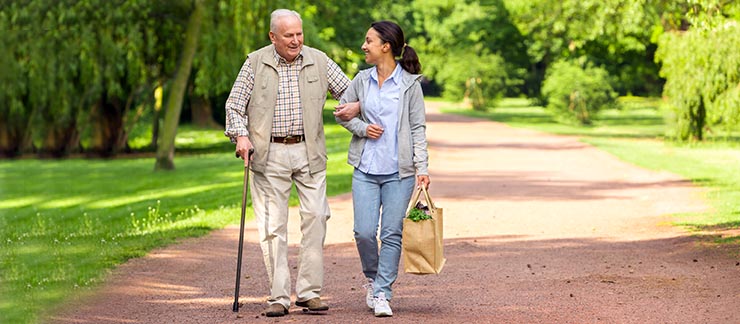
Why Vitamin D is Important for Seniors
You’ve probably heard that vitamin D is important for staying healthy. But has anyone explained why?
Vitamin D is an essential nutrient that absorbs calcium in the body and promotes bone growth. It also plays a vital role in maintaining the health of teeth, muscles, and the immune system. Vitamin D is sometimes called the “sunshine vitamin,” because it’s produced naturally in the body from direct sunlight exposure.
Unfortunately, many elderly people, especially those who are homebound, are susceptible to “vitamin D deficiency” if they are stuck indoors and don’t spend enough quality time outside under the sun.
Effects of Vitamin D Deficiency in Seniors
Seniors who have a deficiency in vitamin D can experience issues, including:
- Weak muscles and fragile bones
Weak muscles and fragile bones – also known as osteoporosis – can make injuries and fractures from accidental falls more likely and potentially more severe.
- Weakened immune system
A weakened immune system can make older adults more susceptible to common infections such as urinary tract infections (UTIs), the flu, or even COVID-19.
- Cognitive impairment and depression
Vitamin D plays a role in maintaining an elderly person’s ability to regulate emotions and think clearly. Low levels of vitamin D are associated with an impaired ability to think and increased symptoms of depression in the elderly.
- Increased risk of non-infectious disease
Vitamin D deficiency in older adults can increase the risk for certain non-infectious diseases, including cardiovascular disease, diabetes, and even some types of cancer.
How Seniors Can Increase Their Vitamin D Levels
Here are four ways seniors can increase their vitamin D levels to stay healthy:
- Get some sunlight
Sunlight is the primary way a person produces vitamin D. According to the Cleveland Clinic, about 15 to 20 minutes of sun on the arms and legs a few times a week is usually sufficient. A stroll in the neighborhood or at a park on a sunny day can provide seniors with many benefits, both physically and emotionally. While sunshine exposure can help increase vitamin D production, it’s critical seniors (or their caregivers) monitor potential skin burn. Excessive time in the sun can be associated with certain diseases, such as skin cancer.
- Sun lamps
Sun lamps can be a good alternative for seniors living in colder climates where the sun is not strong enough in the winter. Sun lamps may also help regulate sleep and reduce symptoms of seasonal depression. Only sun lamps that produce UVB light can help with vitamin D production, so speak with your loved one’s doctor about the risks and benefits before using these devices.
- Eat well
Make sure the food and beverages your senior loved ones consume contain vitamin D. Although vitamin D is not found in many foods naturally, some sources include: cod liver oil, salmon, mackerel, tuna, beef liver, cheese and egg yolks. Many other foods and drinks are also fortified with vitamin D, including milk, breakfast cereals, and fruit juices.
- Dietary supplements
Dietary supplements can help people with vitamin D deficiency reach a healthy level. Research shows older adults who take these supplements are significantly less likely to develop health conditions associated with vitamin D deficiency. However, make sure your loved one takes the correct amount. Speak to your loved one’s doctor and get advice on the correct dose before taking any supplements.
Professional Caregivers Can Help
The recommendations above can be a lot to manage for some older adults and their family members. A Visiting Angels caregiver can help your older loved one follow their physician’s suggestions to boost vitamin D levels by:
- Stocking the refrigerator and pantry with vitamin D rich foods
- Providing reminders about taking supplementary medications
- Encouraging outdoor activities while preventing overexposure to the sun
Contact your nearest Visiting Angels home care location for assistance. Our coordinators are available to discuss how our compassionate caregivers can make a difference during a free home care consultation.


